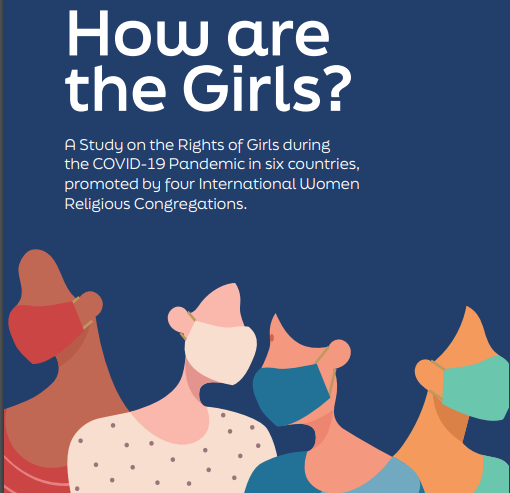
HOW ARE THE GIRLS? – A study on the rights of girls during the Covid-19 Pandemic in Ecuador, Kenya, India, Nepal, Peru and South Sudan
On December 7th, 2022, the Study “How are the Girls?” was presented during a hybrid event taking place in Rome (Italy) and online. The event was promoted by the Congregation of Our Lady of Charity of the Good Shepherd, the Comboni Missionary Sisters, the Sisters of Notre Dame Des Missions and the Salesian Sisters of Don Bosco and hosted by the UISG – Union International Superiors General.
The four congregations have been working for decades in support of girls in the most vulnerable communities across the world. Through a joint project, they have realized an unprecedented multi-congregational research initiative to understand the conditions of the girls in their care, with a special focus on the exercise of their basic rights during the pandemic crisis.
Accordingly, the study presents the situation of girls during the Covid-19 Pandemic in Ecuador, Kenya, India, Nepal, Peru and South Sudan, based on quantitative and qualitative data gathered through direct interviews with about 3400 girls and young women (10 – 20 years old) in the six countries.
The event has seen the participation of the project core team and the research team as well as human rights and advocacy experts, with video contributions from the girl participants in the survey and the local research coordinators from Ecuador, India, Kenya, Nepal, Peru and Sudan.
Among the speakers, Maria D’Onofrio, Advocacy Officer at IIMA & VIDES Human Rights Office in Geneva, spoke about Evidence-based advocacy activities on girls’ rights carried out by the Human Rights Office and encouraged to look at the study “HOW ARE THE GIRLS?” from a human rights advocacy perspective in order to assess whether research-based development projects on one hand, and advocacy efforts on the other, can be mutually reinforcing.
Based on the fact that no advocacy action can truly make sense if it is not grounded in local reality and therefore supported by local actors, IIMA and VIDES Human Rights Office was very grateful for the support provided by this multi-congregational project to consolidate the advocacy actions in Geneva.
As a result, 2 UPR submissions i.e. reports on the situation of children’s rights in India and Ecuador were drafted based on data collected through the survey and submitted to the UN in the context of the Universal Periodic Review of these countries, held in November 2022 (4th cycle). These UPR submissions and its executive summaries were disseminated among 34 States for Ecuador and 45 States for India in order to ensure that the concerns raised by local partners and children and youth interviewed were voiced during the UPR session. The inclusion of these recommendations in the UPR session and their acceptance by the State concerned provide a concrete opportunity for monitoring and implementation on the human rights issues upheld in the recommendations at the local level. In other words, as Maria stated, “we contributed to create a political opportunity for generating more actions by the government and therefore better protection of the rights of girls in Ecuador.”
Speaking of the new windows of opportunities opened by this project, the findings of the study have indicated mental health and digital divide among youth as two particularly critical issues. This is very much in line with key priorities highlighted in the OHCHR Report on Human rights implications of COVID-19 pandemic on young people and in the most recent HRC resolution 51/17 on Youth and Human Rights – both adopted at 51HRC session in October 2022. In particular, the resolution requests OHCHR to conduct a detailed study on the solutions to promote digital education for young people and to ensure their protection from online threats, to be submitted to the Council prior to its fifty-seventh session in September 2024.
In conclusion, Maria called for even more convergence between similar human rights
projects realized on the ground and international advocacy actions. “The study already points the way forward for us and we look forward to continue engaging on this together with relevant partners and other stakeholders.”

